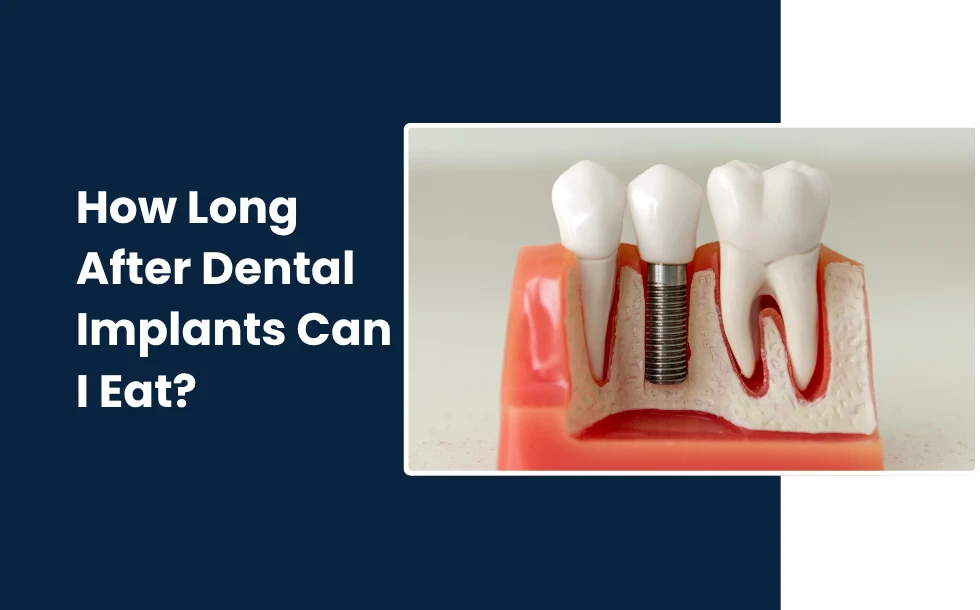One of the first questions people ask after getting implants is “When can I eat normally again?” Knowing what and when you eat after the procedure plays a significant role in proper healing. This treatment lets you eat all your favourite foods, but only after your mouth has healed completely.
Healing period varies for everyone, depending on your bone health, the number of implants placed, and how closely you follow your aftercare instructions. Today, we will guide you on how long after dental implant surgery you can eat normally, what foods to eat, and what to avoid.
Eating After Dental Implant Surgery: Why Timing Matters
Right after surgery, your gums and jawbone start a natural healing process called osseointegration, where the implant fuses with bone to create a secure foundation. Chewing too soon can disturb this process or cause pressure on the surgical site. That’s why following your dentist’s dietary instructions is essential for long-term implant stability. A gradual transition from liquids to soft foods and then solids protects both your healing gums and the new titanium post.

When Can You Eat Normally After the Implant Surgery?
You can’t eat normally right after the surgery because your gums and jaw need time to heal. A liquid diet is recommended for the first couple of days before moving to a soft diet. Many patients ask, “When can I eat solid food after dental implant surgery?” It’s best to wait around six to eight weeks or until your dentist confirms your mouth and new tooth are ready for it.
Dental implant surgery recovery takes time, and you might need several months to return to your normal diet. Everyone heals at a different pace, so don’t rush. Stick to your dental implant recovery diet and aftercare instructions, and make gradual transitions in food texture. This helps you heal faster and protects your new smile for the long term.
If you have had an All-on-4 procedure, your eating timeline will be similar. If you are wondering how long after a dental implant you can chew or get a crown, most patients recover fully and can chew comfortably after six to eight weeks, when the dentist places the crown.
Dental Implant Healing and Eating Timeline
Healing after implant surgery follows a gradual process that extends over several months. All phases, from liquids to soft foods to solids, play a role in protecting the implant and supporting bone fusion.
First 24 – 48 Hours
Your jaw and gums need time to heal around the newly placed titanium post. During this stage, your mouth will feel tender. Stick to cool liquids like pureed soups, smoothies, or blended vegetables. Avoid using a straw, as suction can dislodge the blood clot and delay healing.
Days 3-14 (Soft-Food Stage)
After two days, you can shift to a soft diet. Include vitamin-rich broths, mashed fruits and vegetables, scrambled eggs, and protein shakes. These foods support tissue recovery and reduce swelling.
Many patients ask, Can I eat ice cream after a dental implant? It’s better to choose dairy-free or low-sugar alternatives to avoid inflammation. Avoid very hot or spicy foods until tenderness subsides.
Weeks 3-8 (Transition Stage)
As your mouth adjusts, you can slowly reintroduce foods with gentle texture, such as pasta, soft rice, cooked vegetables, or tender fish. Continue to avoid hard, sticky, or crunchy items that could stress the implant area. Healing continues below the surface as the bone integrates with the implant.
3-6 Months (Return to Normal Diet)
When your dentist confirms full bone integration, you can return to your regular diet. Most patients eat comfortably within three to six months, depending on bone density and healing response.
Foods to Eat After Dental Implant Surgery
Healing requires balanced nutrition that supports gum and bone recovery. Focus on foods that are soft, nutrient-dense, and easy to chew.
Nutrient-Rich Soft Foods
Try mashed potatoes, yogurt, scrambled eggs, smoothies, oatmeal, steamed fish, and cottage cheese. These provide protein and energy without putting stress on your implant site.
Foods That Promote Healing
Add foods rich in vitamin C, calcium, and protein, such as soft tofu, leafy greens, and blended fruit. They help rebuild tissue and strengthen bone surrounding the implant. Staying hydrated and maintaining good oral hygiene will also speed up recovery.
Foods and Drinks to Avoid During Recovery
When you are recovering, what you eat plays a major role in how smoothly healing goes. While it’s tempting to enjoy your favourite crunchy snack, certain foods can delay healing.
Avoid hard or sticky foods like chips, popcorn, crusty bread, nuts, and caramel. These can apply unnecessary pressure to the implant post and irritate healing gums. Also, skip spicy meals, alcohol, and hot drinks, as they can trigger swelling and sensitivity.
For those asking, when can I eat chips, bread, pizza, iced coffee, or popcorn after dental implant surgery? wait at least six to eight weeks or until your dentist confirms the implant is stable. Limit caffeine and avoid very hot beverages until tenderness is gone.
Related Guides:
- How Long a Dental Implant Takes to Heal and Fully Recover
- How to Clean Dental Implants
- What Is an Arch in Dental Implants?
FAQs
What is the timeline for eating after dental implants?
Start with cold liquids for the first 24 to 48 hours, move to soft foods after two to 14 days, and reintroduce regular foods after six to eight weeks or as advised by your dentist.
Can I drink coffee after dental implant surgery?
Yes, but let it cool before drinking. Hot coffee can increase swelling and slow recovery during the first few days.
Can I eat ice cream after dental implants?
Yes, once sensitivity decreases, but avoid extremely cold or high-sugar options that can irritate the surgical site.
When can I chew normally after implants?
Most patients can chew normally within six to eight weeks, once the implant has fused securely with the bone.
Key Takeaway
You can eat soon after implant surgery, but your return to a normal diet should be gradual. By following your dentist’s instructions and sticking to a nutrient-rich, soft-food plan, you protect the implant and help it integrate successfully. Most patients resume their regular eating routine within a few months, enjoying their favourite foods again with complete comfort and confidence.

